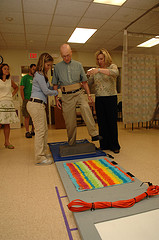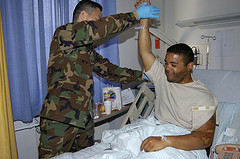 Most of my patients come in to their first physical therapy appointment with their prescription- a scribbling of jargon they may or may not understand- and no idea what to expect. They may have known someone who has gone through physical therapy before, or perhaps heard about it as an option, but never really knew what it was all about. Experiences in physical therapy can vary based on the condition to be treated and each individual’s situation, though there are general similarities in the initial evaluation at the outpatient level of physical therapy, because physical therapists look at the “whole” person. For instance, I look at every person’s posture and gait, regardless of diagnosis. If it’s your first time seeing a physical therapist, here is some general information about what to expect and what to be prepared for at your initial outpatient physical therapy evaluation.
Most of my patients come in to their first physical therapy appointment with their prescription- a scribbling of jargon they may or may not understand- and no idea what to expect. They may have known someone who has gone through physical therapy before, or perhaps heard about it as an option, but never really knew what it was all about. Experiences in physical therapy can vary based on the condition to be treated and each individual’s situation, though there are general similarities in the initial evaluation at the outpatient level of physical therapy, because physical therapists look at the “whole” person. For instance, I look at every person’s posture and gait, regardless of diagnosis. If it’s your first time seeing a physical therapist, here is some general information about what to expect and what to be prepared for at your initial outpatient physical therapy evaluation.
What you should bring to your first appointment:
- The prescription for physical therapy (if you are being referred by a physician)
- Results of any testing such as x-ray, MRI, EMG, nerve conduction velocity
- Questions about your condition and treatment options
- A list of your medical information including your primary care physician’s name, all current medications, medical conditions, and a history of previous surgeries
- Any assistive devices you use for walking: walker, crutches, cane
- Any written instructions for exercise or wound care if you are post-surgical
- Loose and comfortable clothing: Be sure your pants can be rolled up to at least mid thigh. Consider wearing a tank top if you are being seen for a shoulder or neck condition
- Your calendar, so you can make appointments right away if physical therapy is indicated
What to expect during the initial evaluation:
- You will be asked to do some physical activities including walking and performing certain exercises. Your strength will also be tested.
- PTs perform special tests to determine the nature of the condition and make a physical therapy diagnosis. During these tests, your pain may need to be provoked to make an accurate diagnosis.
- Your PT will likely take measurements of strength, range of motion, and flexibility
- PTs ask a lot of questions, your initial evaluation will likely start with a form with questions about your condition and then a discussion with the therapist about the nature of your condition and how it is affecting your daily activities

- When and how your condition began
- Surgical dates
- Your medical history
- If you are experiencing pain, what does it feel like, where are you feeling it, and what activities provoke and relieve the pain
- Sleeping habits: position, is your condition waking you at night
- Is your condition limiting you (painful or restrictive) from bathing, dressing, walking, standing, getting out of bed, cooking, caring for yourself in any way?
- Exercise habits: Are you regularly exercising and what regular exercise are you engaging in?
- Previous treatments for the current condition and how it has been managed since the onset of the condition
Because your strength is tested and you are likely to perform some exercise during the intial evaluation, you make experience some delayed muscle soreness, especially if you are not accustomed to exercise. Rehab is a process. Many conditions take several weeks to properly rehabilitate. Be sure to communicate any personal goals you have with your physical therapist, so that a treatment plan can be formulated to accomplish the goals you have in mind. And remember, this is your physical therapy, so don’t be afraid to ask questions during the process.










January 17, 2010
General Information